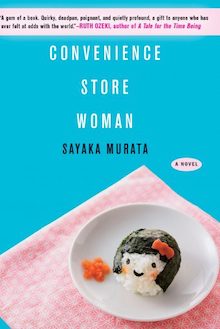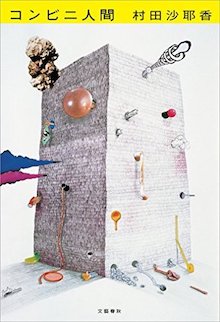Convenience Store Woman [Why This Book Should Win]
Check in daily for new Why This Book Should Win posts covering all thirty-five titles longlisted for the 2019 Best Translated Book Awards.
Elijah Watson is a bookseller at A Room of One’s Own Bookstore. He can be found on Twitter @wavvymango.

Convenience Store Woman by Sayaka Murata, translated from the Japanese by Ginny Tapley Takemori (Japan, Grove)
Convenience Store Woman, winner of the prestigious Akutagawa Prize, is the debut English translation of Japanese novelist Sayaka Murata, who has published nine previous novels in Japan. CSW is about Keiko, a woman in her mid-30s, who has worked at a convenience store in Tokyo since she was an 18-year-old university student. Much to the dismay of her friends and family, she has no interest in leaving the store, and shows no interest in having a life outside of work, including a dating life. The novel is told directly from Keiko’s point of view, allowing readers to see earlier memories of hers that help establish a strong sense of disconnect between Keiko and those around her. An example being when she reflects on finding a dead bird as a child, and doesn’t understand why the other children are disgusted when she picks it up and wants to bring it to her father to eat. These memories also illuminate her sense of the disconnect from societal expectations. Throughout the novel Keiko slowly becomes more receptive to conforming to the ideals of others, mostly so they’ll leave her alone. When slacker Shiraha, who she finds both repelling and interesting, starts working at the Smile Mart with her, she sees in him an opportunity to lead the type of life other’s want for her. She allows Shiraha to begin living with her, though their non-intimate relationship only exists so that she can claim to be taking steps towards the life her friends and family want for her, such as having a marriage and children. This situation naturally begins to dissolve and Keiko is placed in several hectic situations where she has to decide how to take a stand for herself, and prioritize her own true sense of happiness and fulfillment.
 The most captivating conversation between author and reader that takes place in this book is about the relationship between a person and their work; the way people find meaning or purpose through work, how they navigate life outside of it, and the general way they feel while at their job. CSW is a novel about a lot more than just this, it’s also about mental health, managing one’s own neurosis, the importance of sexual relationships, family dynamics, and how to weigh the importance of a sense of belonging in personal situations, as well as societally. However, my favorite aspect of CSW is the base conversation of how Keiko relates to her job, and how those around her treat that relationship. Bookselling is customer service, but bookselling is also much more than a simple retail exchange. I could talk about just that sentence for a long, long time. I’m going to try not to. I very frequently recommend this book to friends of mine who love the type of work they do, but are often pressured by people in their lives to change jobs or “move up in the industry.” To me, the way Keiko finds a balance in her work life and her personal life is really admirable, and it felt very validating to have that opinion and lifestyle presented to me in a way that explores its complexities but doesn’t hand the reader a simple answer. I love to sit at the bookstore I work at in the morning and feel like I’m playing shopkeep, just having nice conversations about something I care about, and having books in my hands all day. I don’t really know why I would ever do anything else, as long as it consistently brings me this much joy and satisfaction. This is a conversation with people in my life that happens a couple times a year but it’s difficult to find a conclusion to, or be able to properly express myself during. It’s more than a little cliched of me to say, but I can’t overstate how cool it was to have a conversation about work that made me feel heard, via a book from another part of the world, and written by someone I can’t talk to without the assistance Ginny Tapley Takemori in translation. CSW should win because it’s a book that hasn’t left my brain since I read it for the first time over a year ago and because Murata wrote the hell out of this book. It’s clever and funny, sardonic and strange, and just felt so necessary to me as I read it.
The most captivating conversation between author and reader that takes place in this book is about the relationship between a person and their work; the way people find meaning or purpose through work, how they navigate life outside of it, and the general way they feel while at their job. CSW is a novel about a lot more than just this, it’s also about mental health, managing one’s own neurosis, the importance of sexual relationships, family dynamics, and how to weigh the importance of a sense of belonging in personal situations, as well as societally. However, my favorite aspect of CSW is the base conversation of how Keiko relates to her job, and how those around her treat that relationship. Bookselling is customer service, but bookselling is also much more than a simple retail exchange. I could talk about just that sentence for a long, long time. I’m going to try not to. I very frequently recommend this book to friends of mine who love the type of work they do, but are often pressured by people in their lives to change jobs or “move up in the industry.” To me, the way Keiko finds a balance in her work life and her personal life is really admirable, and it felt very validating to have that opinion and lifestyle presented to me in a way that explores its complexities but doesn’t hand the reader a simple answer. I love to sit at the bookstore I work at in the morning and feel like I’m playing shopkeep, just having nice conversations about something I care about, and having books in my hands all day. I don’t really know why I would ever do anything else, as long as it consistently brings me this much joy and satisfaction. This is a conversation with people in my life that happens a couple times a year but it’s difficult to find a conclusion to, or be able to properly express myself during. It’s more than a little cliched of me to say, but I can’t overstate how cool it was to have a conversation about work that made me feel heard, via a book from another part of the world, and written by someone I can’t talk to without the assistance Ginny Tapley Takemori in translation. CSW should win because it’s a book that hasn’t left my brain since I read it for the first time over a year ago and because Murata wrote the hell out of this book. It’s clever and funny, sardonic and strange, and just felt so necessary to me as I read it.
In May 2018, for ABA’s Indie’s Introduce jury program, I interviewed the translator of Convenience Store Woman, Ginny Tapley Takemori, and with her assistance, Sayaka Murata, in May 2018 for the ABA’s Indie’s Introduce jury program.

Leave a Reply